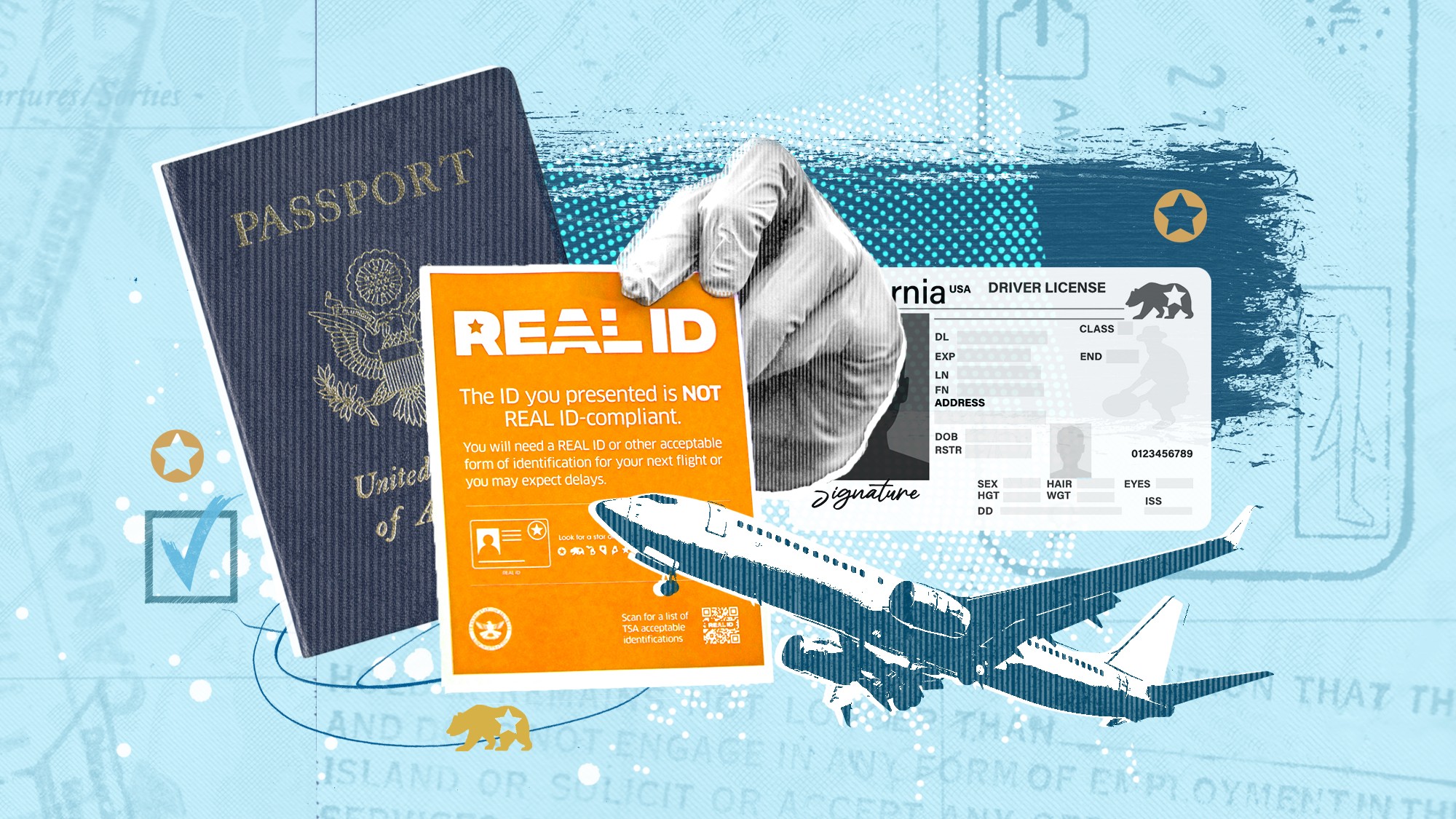What to know about Real IDs, America's new identification cards
People without a Real ID cannot board a commercial flight as of May 7, 2025


A free daily email with the biggest news stories of the day – and the best features from TheWeek.com
You are now subscribed
Your newsletter sign-up was successful
It has been nearly impossible to go to an airport in the past few years without seeing signs about Real IDs. The updated identification card, required at the behest of Congress, has long been in the news, as the deadline to get one has approached (and been continuously pushed back). But the time has finally come, and anyone looking to board a plane will have to have a Real ID to do so as of this week. Some Americans may already be Real ID compliant, even if they aren't aware.
What is a Real ID?
It is a key part of the Real ID Act of 2005. Passed by Congress in the wake of the Sept. 11, 2001, terrorist attacks, the act "establishes minimum security standards for license issuance and production," according to the U.S. Department of Homeland Security (DHS).
The act also stops certain federal agencies from accepting certain forms of identification, such as a state driver's license or state identification card, because they don't meet these specific requirements.
The Week
Escape your echo chamber. Get the facts behind the news, plus analysis from multiple perspectives.

Sign up for The Week's Free Newsletters
From our morning news briefing to a weekly Good News Newsletter, get the best of The Week delivered directly to your inbox.
From our morning news briefing to a weekly Good News Newsletter, get the best of The Week delivered directly to your inbox.
Per the DHS, people without a Real ID-compliant form of identification cannot access certain federal facilities and military bases or enter nuclear power plants. The most pressing restriction for most Americans, though, is that people without a Real ID cannot board a commercial flight. Once the law goes into effect, a driver's license or state identification card without a Real ID seal will not be accepted at any airport security checkpoints.
It is unclear what exactly will occur if someone without a Real ID attempts to pass through security. But passengers who "present a state-issued identification that is not REAL ID compliant and who do not have another acceptable alternative (e.g., a passport) can expect to face delays, additional screening and the possibility of not being permitted," said the DHS.
Why is the Real ID program being implemented?
Following Sept. 11, the 9/11 Commission was established to investigate the causes of the attacks. In its official report, one of the commission's recommendations was to establish uniform federal standards for all forms of identification documents — particularly those involved in air travel.
"The federal government should set standards for the issuance of birth certificates and sources of identification, such as driver's licenses," the report said. "At many entry points to vulnerable facilities, including gates for boarding aircraft, sources of identification are the last opportunity to ensure that people are who they say they are and to check whether they are terrorists."
A free daily email with the biggest news stories of the day – and the best features from TheWeek.com
As a result, if someone wants to "use a state-issued ID for plane travel, you'll need to have an enhanced driver's license, an enhanced ID card or another type of state ID that is compliant with the federal Real ID Act," said Axios. However, there are some exceptions, as "passports, green cards, military IDs and certain other documents also will be accepted for air travel between U.S. states," meaning people without Real IDs will still be able to board planes if they have one of these.
How long do you have to get a Real ID?
Many people already have one, as the DHS reports that "81% of travelers at TSA checkpoints present an acceptable identification using a state-issued Real ID." Otherwise, the deadline to be Real ID compliant is May 7, 2025; on that day, travelers "must be Real ID compliant to board domestic flights and access certain federal facilities," said the DHS. This marks the final chapter in a series of setbacks for Real ID deadlines, largely because of the Covid-19 pandemic disrupting international travel. In 2022, the DHS pushed the deadline back from May 7, 2023, to the current date of May 7, 2025.
But again, experts say a Real ID is not technically necessary if you have a passport. According to Passport Health, a company that provides travel medicine and immunizations, "an official U.S. passport will get you through airport security and can be used in place of a Real ID. If you are only traveling domestically, you can use a Real ID or passport." This has been backed up by the DHS itself, which states, "The card, itself, must be Real ID compliant unless the resident is using an alternative acceptable document such as a passport."
Why is the Real ID program controversial?
It is largely based on the purported invasion of privacy. Real IDs will "facilitate the tracking of data on individuals and bring government into the very center of every citizen's life," said the American Civil Liberties Union. It will "definitively turn driver's licenses into a form of national identity documents," which will have a "tremendously destructive impact on privacy."
The debate about the Real ID program has been raging almost since Congress put pen to paper. The bill faced opposition from "hundreds of civil liberties groups, immigrant support groups, and government associations," said a 2005 Wired article, as "critics say it would produce a de facto national ID card, cost states millions of dollars and punish undocumented immigrants."
Despite some opposition, it is unlikely that the Real ID Act is going to go away, with DHS saying the program has "significantly improved the reliability and accuracy of state-issued driver's licenses and identification cards." The agency will "implement innovations to make the process more efficient," Former Homeland Security Secretary Alejandro Mayorkas said in 2023, but current Secretary Kristi Noem has spoken little on Real IDs. She did, however, say that the new IDs will "make identification harder to forge, thwarting criminals and terrorists," on X.
Justin Klawans has worked as a staff writer at The Week since 2022. He began his career covering local news before joining Newsweek as a breaking news reporter, where he wrote about politics, national and global affairs, business, crime, sports, film, television and other news. Justin has also freelanced for outlets including Collider and United Press International.
-
 How the FCC’s ‘equal time’ rule works
How the FCC’s ‘equal time’ rule worksIn the Spotlight The law is at the heart of the Colbert-CBS conflict
-
 What is the endgame in the DHS shutdown?
What is the endgame in the DHS shutdown?Today’s Big Question Democrats want to rein in ICE’s immigration crackdown
-
 ‘Poor time management isn’t just an inconvenience’
‘Poor time management isn’t just an inconvenience’Instant Opinion Opinion, comment and editorials of the day
-
 Quiet divorce is sneaking up on older couples
Quiet divorce is sneaking up on older couplesThe explainer Checking out; not blowing up
-
 Admin night: the TikTok trend turning paperwork into a party
Admin night: the TikTok trend turning paperwork into a partyThe Explainer Grab your friends and make a night of tackling the most boring tasks
-
 Hawai‘i: a kingdom crossing oceans – a ‘thrilling’ exhibition
Hawai‘i: a kingdom crossing oceans – a ‘thrilling’ exhibitionThe Week Recommends With some items on display for the first time since 1900, the British Museum’s new show gives voice to a ‘fascinating, rarely heard culture’
-
 More than a zipper: Young Black men embrace the ‘quarter-zip movement’
More than a zipper: Young Black men embrace the ‘quarter-zip movement’The Explainer More than a zipper: Young Black men embrace the ‘quarter-zip movement‘
-
 Jane Austen lives on at these timeless hotels
Jane Austen lives on at these timeless hotelsThe Week Recommends Here’s where to celebrate the writing legend’s 250th birthday
-
 Pull over for these one-of-a-kind gas stations
Pull over for these one-of-a-kind gas stationsThe Week Recommends Fill ’er up next to highland cows and a giant soda bottle
-
 The Beast in Me: a ‘gleefully horrible story’
The Beast in Me: a ‘gleefully horrible story’The Week Recommends Claire Danes and Matthew Rhys star in a ‘gleefully horrible story’
-
 5 ghost towns worth haunting on your next road trip
5 ghost towns worth haunting on your next road tripEnjoy a glimpse of the past
